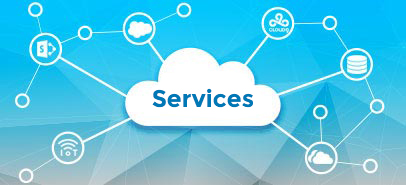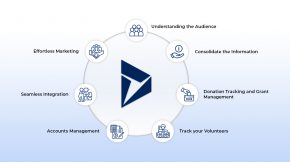The Future of Data: A Complete Guide to Cloud Data Warehousing
Due to storage issues of critical data, the hi-tech world introduced cloud data warehouses. Where it is easy to manage the stored data, not like old on-premises data warehouses. Traditional warehouses have been serving for 50-plus years. But now people are shifting to modern data warehouses for more appropriate and insightful results.
So, if your business wants to make accurate decisions, cut the administration overheads, minimize on-premises overhead cost, foster flexibility, and need to visualize and analyze the large amount of data then cloud will be the best option.
In this blog, we are going to discuss cloud data warehouse, its features, benefits, challenges, and how it will affect your business optimization.
What is a cloud data warehouse?
A cloud data warehouse is a modern place to store all the confidential data of companies. Where, anyone can access the data without trouble like the on-premises data warehouse. A cloud platform means there will be storage of data in a free place, where it is easy to access the data when needed. It is unilateral to all, not only for the authority level who will have the access to open the door and go through the data.
Organizations can store structured, semi-structured, and unstructured data, and then analyze it in real time or near real time. Moving to cloud data storage lets professionals access and use data from anywhere, breaking down location barriers and making data management more flexible and convenient.
Features of a Cloud Data Warehouse
Today’s market offers a wide variety of cloud data warehouses each with unique potential. Despite spacing, most cloud data warehouses share various core features that make them essential for modern data management.
- Data storage: Cloud data warehouse has enough space to store more and more data in every form. It also offers a scalability option to manage your data. Some of them also offer the features of compression and deduplication to avoid and remove the extra space.
- Data security: Cloud data warehouse provides sturdy security system whether the data is in rest mode or transiting. They also provide tools to manage access control and auditing. This guarantees that your data is not only securely stored and efficiently processed but also safeguarded from potential threats.
- Data integration: Cloud data warehouse gives robust and assured integration system, so that data can be easily and quickly separated.
- Performance: Some cloud data warehouses offer fast processing and high–performance speeds for the professional whose time is vital to utilize another place not just at one.
- Accessibility: The other feature of the cloud data warehouse is its accessibility. The data can be accessible from anywhere with a good internet connection.
Top cloud data warehouse benefits
There are many benefits related to data management which is essential for cloud data warehouse. It does impact in storage, analysis and manipulation of data in organization.
- Cloud data warehouse proved cost-effective for organization. It brought drastic change in data storage by reducing the investment and the maintenance cost.
- Benefit of cloud data warehouses now has increased. The performance can curb complex problems and large data with incredible speed.
- Data security is not that good in initial cloud platforms. But over time, modern cloud data software has become more accurate. Business can achieve advance feature data from the cloud data warehouse. Which they cannot get through the on-premise data.
Cloud Data Warehouse Automation
Cloud data warehouse automation is the process of collecting, analyzing, extracting and managing data through many stages of automation for immaculate results. It saves time by standardizing and integrating data from various sources. It also delivers real-time updates for visualization and analytical tools, save time and efforts: –
Data Ingestion: Data ingestion automatically imports data from various sources. It keeps data fully automatic without manual intervention.
Data Transformation: Data transformation cleans and processes raw data. It transforms data for analysis by using cloud computing.
Storage & Organization: It automates storage management, making it easy access and ensures the best problem-solving solutions.
Analysis & Reporting: Cloud data warehouse automates report generations, enabling faster insights and irregular detections.
Continuous monitoring: Continuous monitoring means monitoring data automatically for optimized performance, smooth operations and resource allocations.
Cloud Data Warehousing Challenges
Though every perfect thing has imperfections apart from having many benefits. There are still some challenges that Cloud data warehouse is facing; we are discussing them below:
- If we move large datasets and applications to on-premise data warehouse, it takes a lot of time and effort which may lead to challenges.
- After a company invests a lot in one cloud provider, switching to a different platform can be hard and expensive. Thus, creating a reliance on that single vendor.
- Latency issues can be seen in the cloud platform data extraction and processing might be slow. It depends on the network, which may impact the real time analytics.
- regulations
Cloud Data Warehouse Solutions in 2024
Cloud data warehouse solutions follow a pay-per-use pricing frame to attract startups and expanding organizations. They offer almost similar benefits like usability, scalability, performance, where implementation can vary. Companies should assess unique characteristics of platforms such as Amazon Redshift, Google BigQuery, Microsoft Azure and Snowflake to identify the ideal option for their needs.
Snowflake: Snowflake is a cloud-native data warehousing platform that delivers scalable and comprehensive solutions and helps organizations manage and analyze data. As it is a SaaS platform, it prioritizes adaptability, efficiency, simplicity, and catering to organizations‘ need for a contemporary cloud data warehouse solution.
Application:
- Enables analytical solutions and business intelligence.
- Assists data sharing among teams and real-time complicity.
- Generates dashboards and reports for accurate decision making.
- Merge unstructured and structured data from various sources.
Advantages:
- User-friendly interface with minimal setup requirements.
- Allows secure data sharing across variant companies smoothly.
- Has automatic optimization and delivered fast query solutions.
- Consolidate scaled up and down data based on workload demands.
Disadvantages:
- Limits flexibility while depending on single cloud provider.
- Integrating legacy systems might be challenging.
- High usage and frequent data queries can become expensive.
- Less control over architecture compared to on-premise solutions.
Microsoft Azure Synapse Analytics: Microsoft Azure Synapse Analytics’ analytics merges big data analytics with enterprise data warehousing to increase insights. It provides a platform for data integration, analysis and management. It allows users to analyze data using both SQL and Spark. If your organization already uses Microsoft Azure, then it upgrades your data stack.
Applications:
- Analyze massive datasets using spark and other big data techniques.
- Creates dashboards and reports using integrated BI tools.
- Shows real time data processing for quick data insights.
- Extracts, transforms and loads the data from various data sources.
Advantages:
- Combines all other data into one unified data.
- Supports multiple programming languages and query methods.
- Has capability of real time data processing and providing insights.
- Extends storage depending on the needs of workload.
Disadvantages:
- Price can become important with increased usage and workload.
- Using new and different tools can be challenging to new users.
- Organizations that are heavily using Azure may face problems if the switch provider.
Redshift: Redshift by Amazon is a fully managed, cloud-based data warehouse solution from Amazon Web Services (AWS) that’s built to handle massive datasets with ease. It’s engineered to provide high-speed analytics, making it a top choice for organizations in need of scalable, cost-effective solutions. Redshift excels at supporting complex analytical workloads and powering business intelligence initiatives.
Applications:
- For analysis it efficiently prepares the data to process extract, transform and load the operation.
- Enables near real-time analytics by integrating with other AWS services like Kinesis and Data Streams.
- Good for managing and storing large volumes of semi-structured and structured data.
- Foster reporting and advanced analytics for decision making.
Advantages:
- Reduces burden by automating the backups and maintenance.
- Easily scales from gigabytes to terabytes.
- Sturdy security system protects sensitive data.
- Offer fast query processing for tough analytical work.
Disadvantages:
- Has limited data flexibility and may cause issues with transactional data.
- Manual workforce may also need to make certain adjustments for optimization.
- All features might not be available in every region.
- Heavy software may cause much cost.
BigQuery: BigQuery Google’s fully managed, highly scalable, serverless cloud data warehouse is called BigQuery. BigQuery is designed for businesses seeking an intuitive, quick, and adaptable analytics platform with integrated machine learning features. It is particularly strong at handling massive amounts of data.
Applications:
- One interface with more Google Cloud services.
- Carries out real-time analytics quickly and with little latency.
- ETL is used to efficiently process data.
- Conveniently stores and evaluates big datasets
Advantages:
- Provides real-time data ingestion capabilities and quick SQL queries.
- Offers encryption, access controls, identity management, and enhanced security features.
- Able to analyze real-time insights from streaming data utilizing tools like Google Cloud.
- Known SQL codes make adoption simple.
Disadvantages:
- When processing extremely complicated queries, performance can suffer, particularly in the absence of optimization.
- Pay-per-use fees apply to queries, but long-term storage of large datasets can get pricey.
- Integrating with the larger ecosystem may present a challenging learning curve for users who are not familiar with Google Cloud.
- A heavy reliance on Google Cloud services may make switching to other cloud systems difficult.
The Future of Your Data with Beyond Key
You have now seen the advantages of cloud data warehousing. It is clear that the old ways of storing and managing data cannot keep up with the needs of modern businesses. Cloud data warehouses offer more flexibility, faster access, and lower costs.
But this is not just about technology. It is about what your business can achieve. With Beyond Key, you can make decisions faster because your data is always ready, always accessible. You can reduce the time spent on managing systems and focus more on growing your business.
Imagine a system that grows as your company grows. A system that allows your team to work from anywhere. This is what Beyond Key offers. You are not just storing data; you are unlocking new possibilities for your business.
Now is the time to move forward. Start your journey with Beyond Key’s cloud data warehouse and see how it can help you achieve more.












